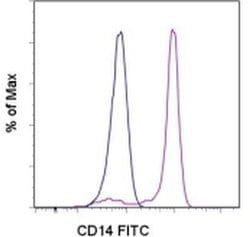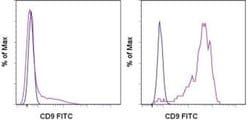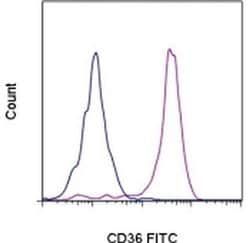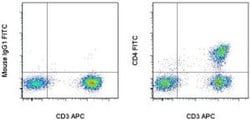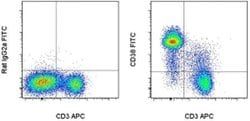CD34 Monoclonal Antibody (4H11), FITC, eBioscience™, Invitrogen™
Manufacturer: Fischer Scientific
Select a Size
| Pack Size | SKU | Availability | Price |
|---|---|---|---|
| Each of 1 | 50-953-4-Each-of-1 | In Stock | ₹ 22,695.00 |
50-953-4 - Each of 1
In Stock
Quantity
1
Base Price: ₹ 22,695.00
GST (18%): ₹ 4,085.10
Total Price: ₹ 26,780.10
Antigen
CD34
Classification
Monoclonal
Concentration
5 μL/Test
Formulation
PBS with 0.2% BSA and 0.09% sodium azide; pH 7.2
Gene Accession No.
P28906
Gene Symbols
Cd34
Purification Method
Affinity chromatography
Regulatory Status
RUO
Gene ID (Entrez)
947
Content And Storage
4° C, store in dark, DO NOT FREEZE!
Form
Liquid
Applications
Flow Cytometry
Clone
4H11
Conjugate
FITC
Gene
Cd34
Gene Alias
(E3-independent) E2 ubiquitin-conjugating enzyme R1; AU040960; CD34; CD34 antigen; CD34 molecule; CDC34; cell division cycle 34; cell division cycle 34 homolog; cluster designation 34; cluster of differentiation antigen 34; E2 ubiquitin-conjugating enzyme R1; E2-CDC34; hematopoietic progenitor cell antigen CD34; hematopoietic progenitor cell marker CD34; Mucosialin; RP11-328D5.2; sialomucin protein; type 1 transmembrane protein; UBC3; UBCH3; UBE2R1; ubiquitin carrier protein; ubiquitin conjugating enzyme E2 R1; ubiquitin-conjugating enzyme E2 R1; Ubiquitin-conjugating enzyme E2-32 kDa complementing; ubiquitin-conjugating enzyme E2-CDC34; Ubiquitin-protein ligase R1
Host Species
Mouse
Quantity
100 Tests
Primary or Secondary
Primary
Target Species
Human
Product Type
Antibody
Isotype
IgG1 κ
Related Products
Description
- Description: The 4H11 monoclonal antibody reacts with human CD34, also known as mucosialin
- CD34 belongs to a protein family which also includes endoglycan and podocalyxin
- Members of this family are single pass transmembrane proteins with a heavily glycosylated extracellular and N-terminal mucin domain
- CD34 was first identified as an antigen expressed on hematopoietic progenitors, and has since been extensively used as a marker to isolate cells capable of hematopoietic cell engraftment
- In spite of this, the function of CD34 remains unresolved
- In addition to expression on hematopoietic progenitors, CD34 is expressed on some populations of mesenchymal stem cells, tumor cell lines, and by vascular endothelia in the adult
- Epitopes of CD34 have been assigned to three classes (class I, II or III) based on their differential sensitivity to enzymatic cleavage by neuraminidase, chymopapain, or O-glycoprotease
- According to this analysis, the 4H11 antibody belongs to class III, indicating that it reacts with a protein epitope
- Applications Reported: This 4H11 antibody has been reported for use in flow cytometric analysis
- Applications Tested: This 4H11 antibody has been pre-titrated and tested by flow cytometric analysis of normal human peripheral blood cells
- This can be used at 5 μL (0.5 μg) per test
- A test is defined as the amount (μg) of antibody that will stain a cell sample in a final volume of 100 μL
- CD34 is a highly glycosylated monomeric with a molecular weight range of 111-115 kDa surface protein that is present on many stem cell populations
- CD34 is a stem cell marker although its expression on human hematopoietic stem cells is reversible
- CD34 may serve as a surface receptor that undergoes receptor-mediated endocytosis and regulates adhesion, differentiation and proliferation of hematopoietic stem cells and other progenitors
- CD34 expression is likely to represent a specific state of hematopoietic development that may have altered adhering properties with expanding and differentiating capabilities in both in vitro and in vivo conditions
- CD34 is possibly an adhesion molecule with a putative role for mediating the attachment of stem cells to the bone marrow extracellular matrix or directly to stromal cells
- Further, CD34 could act as a scaffold for the attachment of lineage specific glycans, allowing stem cells to bind to lectins expressed by stromal cells or other marrow components
- CD34 is thought to have a role in presenting carbohydrate ligands to selectins
- The intracellular chain of the CD34 antigen is a site of phosphorylation by activated protein kinase C suggesting a putative role in signal transduction
- Diseases associated with CD34 dysfunction include dermatofibrosarcoma and neurofibroma.

